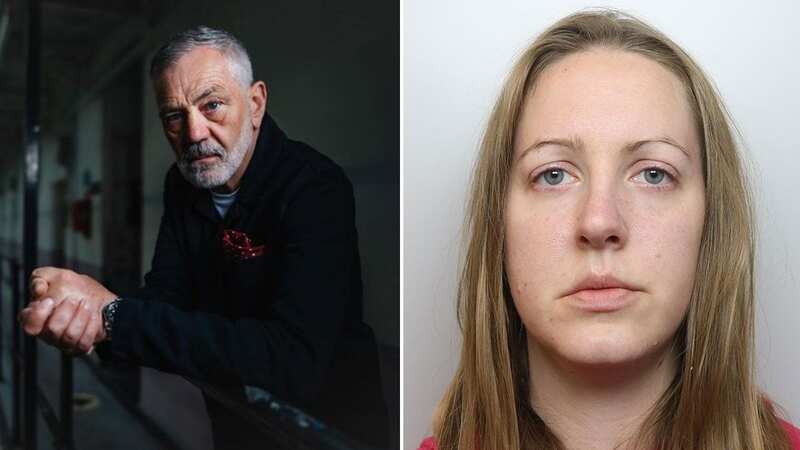'Lucy Letby's crimes are unforgivable – she was always going to be hard to stop'

Just a few weeks after Lucy Letby’s trial started, my grandson Ronan was born two months prematurely.
In the days that followed I got to know his neonatal unit well and watched on helplessly as his little body, almost entirely hidden by tubes, fought for life – his tiny heart straining to beat in and then out again. Every second was unbelievably distressing and, had it not been for the skills and humanity of the neonatal nurses, almost unbearable.
Those nurses were extraordinary women – I did not encounter a single male professional on the unit – who always seemed to know how to re-assure, advise, encourage and instinctively understood the right thing to say when events seemed to become too painful to contemplate. They were superhuman or, to use that trite expression, ‘angels’.
However, I’d be dishonest if I didn’t say that I also watched them through a criminological lens - as someone who has researched and written about health care serial killers. Specifically, nurses who kill within hospital settings – research that seemed to take on a whole new dimension when, after a three-year police investigation which started in 2017, Letby got charged with murdering seven babies and attempting to kill ten others at the neonatal unit where she worked at the Countess of Chester Hospital.
 Lucy Letby has been convicted of murdering seven babies in her care (Chester Standard / SWNS.com)
Lucy Letby has been convicted of murdering seven babies in her care (Chester Standard / SWNS.com)
Sometimes angels can be angels of death - nurses like Beverley Allitt, who was convicted of murdering four infants and attempting to murder three others at Grantham and Kesteven Hospital, or Charles Cullen who, during his 16-year nursing career probably became America’s most prolific serial killer.
Unconsciously I started to apply my research to what had happened at Chester and how Letby was described as a nurse. In my research I noted that nurses who murder in hospitals have clusters of “red flags” – issues, or personal qualities that mark them out as serial killers. The most common red flags were higher incidences of deaths on his/her shift; has a history of mental instability/depression; makes colleagues anxious; is found to be in possession of drugs in his/her locker, or at home; and, appears to have a personality disorder.
Specific details from Chester were difficult to come by, but statistics appeared to suggest that there were spikes in the number of deaths on the unit when Letby was working. However, again based on my research, this was both the most common indicator that something untoward was happening, but also the most problematic to use as evidence that it was a serial killer who was responsible for those spikes. Statistics can be difficult to interpret at the best of times, but even more so in a hospital where people attend because they are sick – sometimes with life-threatening illnesses – and on, for example, a neonatal ward where many babies are simply not going to be able to overcome their structural health defects.
Sadly, deaths occur in hospitals and so the message from my research was never to use this statistical indicator as evidence in itself, but only in conjunction with other red flags.
And, while Letby didn’t make her colleagues anxious – she was popular and well-integrated into the team, and nor were other red flags particularly prominent, evidence emerged about her controlling personality and her tendency to behave inappropriately around the parents of the children who had died. There was no “smoking gun”, but rather a cumulative mass of circumstantial evidence that taken together indicated not only her narcissism and need for attention, but also how these character flaws only flowered when the children that she should have been caring for became ill or died.
The parents of these children and those who were harmed will want to know why – why did Letby behave in this murderous way? Angels of death crave power and the ultimate expression of their craving is to decide who should live and who should die. This God-like need to be omnipotent and in control only finds an outlet when they are surrounded by those who are weak, ill and defenceless and when there is no, or insufficient oversight to check their professional performance.
We put our trust in nurses and doctors in the hope of receiving care. Angels of death breach that trust – the expectation that they should not only do no harm but also heal which is implicit in the relationship that should be established when we, or our loved ones go into hospital. That’s why these crimes are so despicable; so evil; unforgivable.
Thankfully, we need to take solace from the fact that nurses like Letby are rare.
As for Ronan, I’m pleased to report that as a result of the professionalism of those superhuman neonatal nurses who he encountered, he’s in rude health, growing every day and proving himself to be the bundle of joy that we had all hoped for.
Let’s think about them – those real ‘angels’ - rather than our latest serial killer.
Read more similar news:
Comments:
comments powered by Disqus

































